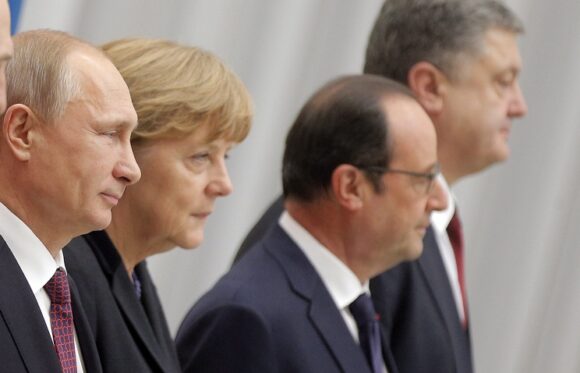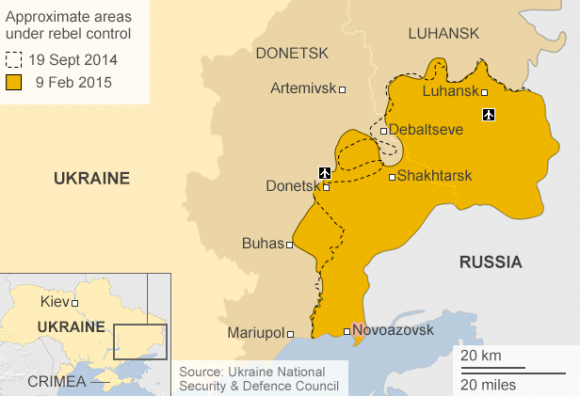
After a 16-hour long marathon of negotiations on Feb. 11, and a great deal of suspense, Angela Merkel and François Hollande wrenched out a hard-won agreement for a cease-fire in Ukraine from Petro Porosnhenko and Vladimir Putin starting on Saturday, Feb. 14 at midnight. All parties to the agreement were extremely cautious and hoped that “Minsk 2” would last longer than “Minsk 1” signed in September 2014.
More than 5,500 people have died in the conflict during the past 10 months, which makes it the deadliest in Europe since World War II. There was a sense of relief that the agreement went through and thus a disaster had been avoided. In the morning, Putin joked that he had had better nights but felt satisfied.
To continue the negotiations rather than slamming more sanctions on Putin, as some Washington pundits advocate, was the objective of Minsk 2. Sanctions have a cost for Europe (for example, the Russian government retaliated to earlier sanctions by blocking the import of produce from Western Europe.) More dangerously, they exacerbate the nationalism of Putin and enhance his popularity in Russia.
In the face of a threatening strategy of Daesh* making well planned inroads to destabilise Europe by recent acts of terrorism, Russia and the European Union (EU) have a common enemy. For decades, the extremist Moslem opposition in Chechnya and Central Asia has been a great fear for the Russian government..
The talks in Minsk started in a polar atmosphere. Throughout the night, Petro Poroshenko’s and Vladimir Putin’s teams moved like a choreographed ballet. Early in the morning, Putin left the room, slamming the door, only to reappear a few minutes later. The Franco-German duo is to be credited with an unflappable tenacity to reach an agreement. The two worked perfectly together. Merkel needed Hollande since she wants to avoid making foreign policy decisions alone and prefers,“Leading from the center,” to use a formula coined by the German Minister of Defence Ursula von der Leyen.

Minsk 2 includes modified provisions to make the process move forward. The buffer zone – cleared from all heavy armaments – has been widened from 30 km to 70 kms. The European Council for Stability and Security will be monitoring the application of the agreement. Putin expressed his demands for the autonomy of the Luhansk and Donestk regions..
The EU widely considers that Ukraine is both a corrupt and failed state. It cannot afford to help it financially nor envisages its adhesion to the EU any time soon. Kiev does not want to lose the industrial and mining Donbas region, but its action is disorganized. For many months, Putin has claimed that he never intervened in the conflict taking place in Eastern Ukraine.
One wonders whether he really controls the Russian separatists, so different from the sophisticated Maidan crowd. The Donbass miners and blue collar workers are products of massive transfers of population forced by the Soviets at the time of the German offensive to compensate for the relocation of highly skilled workers to the Ural Mountains. Another headache for Putin is the presence among the Russian separatists of clans whose leaders have political ambitions .
It is hard to understand Putin’s strategy. Obviously he does not want NATO to choke him nor nuclear misssiles to be installed in the area. He does not have the means to support the Donbas. His priority should most likely be to allow a corridor from Rostov on Don, through Mariopol on the Sea of Azov and then leading to the Crimea. At present his only access to the Crimea is through the Straits of Kerch, which is some distance away.
*The new nickname for ISIS widely used in France, Australia and some other countries because ISIS supposedly dislikes it intensely — it is a loose acronym of the Arabic description of ISIS, which does not acknowledge any statehood for the organization but rather can be roughly translated as, “One who crushes something underfoot,” or, “One who sows discord.”

About the author: Nicole Prévost Logan divides her time between Essex and Paris, spending summers in the former and winters in the latter. She writes a regular column for us from her Paris home where her topics will include politics, economy, social unrest — mostly in France — but also in other European countries. She also covers a variety of art exhibits and the performing arts in Europe. Logan is the author of ‘Forever on the Road: A Franco-American Family’s Thirty Years in the Foreign Service,’ an autobiography of her life as the wife of an overseas diplomat, who lived in 10 foreign countries on three continents. Her experiences during her foreign service life included being in Lebanon when civil war erupted, excavating a medieval city in Moscow and spending a week under house arrest in Guinea.